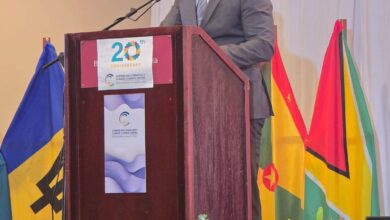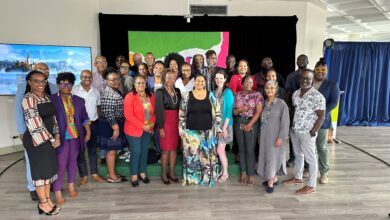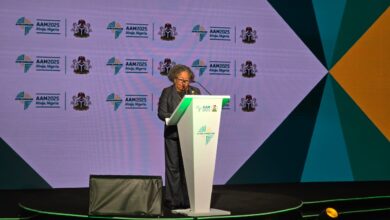Mr Chairman
Mr Secretary General
Colleague Ministers
Members of the Diplomatic Corps
Ladies and Gentlemen:
I am always delighted to have the opportunity to visit St Lucia where traditional Caribbean hospitality is offered with more than a soupcon of French flavour. Let me therefore, on behalf of my delegation, thank our hosts, the Government and people of St Lucia for having us.
It seems like just yesterday that Guyana assumed the Chairmanship of COFCOR and this is so, I think, because events have occurred with such rapidity over the past year that we have had little time to fully analyse them and appreciate the long-term effects which they are likely to have on our foreign and community relations. We would therefore do well to continue our reflection in order to draw from our experience those lessons that should inform our future attempts at foreign policy coordination. As I demit office now, and hand over the Chairmanship to our Colleague Julian Hunte, I would like to share some views with you in the hope that they may contribute to our discussions over the next two days.
At the outset, let me remark, if only by way of a general introduction that, of all the occurrences during the past twelve months, there was none more earth-shaking event than the September 11 attack on the United States. Eight months later its after-shocks are still being felt throughout the world and more especially in the Caribbean which, because of its proximity to the target, is particularly sensitive to the continuing tremors. Today our Region faces a new set of political and economic realities created in the aftermath of the tragedy. It is as if overnight a new world order has been established, requiring compliance with different rules and regulations.
In response to various resolutions of the United Nations, we have had to implement a wide range of measures to insulate the world and our peoples from the contagion of terrorism. Despite the cost to our national budgets, we have not hesitated to do so since we must defend our air, land and sea spaces. These defences are, however, not impervious to other major threats such as the trafficking in arms and drugs, which continue to ravage our economies and our societies. Nor are they resistant to the waves of criminal deportees washing up on our shores, bringing havoc in their wake.
We also continue to face the dangers posed by the shipment of nuclear waste through the Caribbean Sea. Even as we meet yet another shipment is about to traverse our waters despite several calls made by our Heads of Government to the States concerned to review their position on this matter. This is another example of the challenges facing small and vulnerable States like ours as we seek to preserve and manage our precious natural resources for the benefit of our peoples. As we agreed at our last meeting, we should now be preparing for the report to the United Nations General Assembly this year on the follow up to the Resolution passed by that body calling for an Integrated Management Approach to the Caribbean Sea Area in the context of Sustainable Development.
Colleagues, Ladies and Gentlemen – As our Heads of Government concluded both in The Bahamas last October and in Belize just a few months ago, security concerns continue to hold the development agenda of our Region to ransom. In most CARICOM countries where services are the dominant sector and tourism accounts for a third and, in some cases, two-thirds of GDP, the spectre of high unemployment looms large, leading to increased levels of poverty and social dysfunction. For other countries such as my own, export earnings are likely to suffer as a result of falls in commodity prices and the global economic slow-down. And in all cases, the outlook for private investment flows, economic diversification and longer term growth remains discouraging.
Our regional diplomacy must now be galvanised to revive our flagging economies. Immediately after the Inter-Sessional Meeting of Heads in Belize, we flew to The Bahamas for a dialogue with Secretary of State Colin Powell of the United States, CARICOM's most important hemispheric partner. In those discussions we were able to convey our urgent concerns for regional peace and security as well as for the sustainable development of our countries. And recently in Georgetown, Guyana, at the UK-Caribbean Forum, we took the opportunity of engaging the British Secretary of State Jack Straw in an exchange of views on many of the same issues. It is fair to say that both these encounters were promising, giving rise to the hope that there is sympathy and support abroad for CARICOM countries in these difficult times.
However, if we are to see substantial gains from these meetings, it is absolutely essential that we sustain the diplomatic momentum in order to concretize the general agreements reached. Accordingly, I have since written, on behalf of the COFCOR, to Secretary of State Colin Powell, thanking him for his understanding of our problems and urging him to take action in those areas where US assistance is now critically needed. Hopefully, we will be able to resume our dialogue with him at the OAS General Assembly which will be held this coming June in Barbados. Similarly, we must follow up swiftly on the outcome of our talks with the UK to ensure that the promise of cooperation in the important areas of trade, investment and information technology is fulfilled. As agreed in Guyana, we should now activate the transmission mechanism to signal our interests to the G-8 and in the EU-LAC meetings, both of which are important as well as imminent.
In keeping with COFCOR's determination to extend the Region's relations with traditional partners such as the UK, the US, Canada and Japan, we should seek to intensify our approaches to countries in our own hemisphere, particularly those on our immediate periphery such as Brazil, Colombia, Central America, Mexico and Venezuela.
As was clearly demonstrated at the last ACS Summit in Margarita, the potential for strategic development is great. There is a clear and present need for the strengthening of diplomatic ties, the deepening of cooperation links between regional institutions, and the building of infrastructure – especially in communication technology and air, land , and sea transport. With the advent of the FTAA and a closer relationship with entities such as the Andean Pact and MERCOSUL, these initiatives cannot be postponed for too long. At the same time, we must look farther afield, in the spirit of South/South cooperation, to develop closer ties with the countries of Africa and Asia.
It goes without saying that the creation of the CARICOM Single Market and Economy is a major objective of the regional integration process and consequently, an important item on COFCOR's immediate agenda. External support for the Market and its supportive machinery, such as the Caribbean Court of Justice will be essential to the building of a solid foundation. The guarantee of an extended waiver of WTO rules as well as special and differential treatment for our exports, are indispensable to the enterprise. Equally important is the establishment of a Regional Development Fund in the context of the FTAA to help the smaller economies, those which are at differing stages of development, to adjust to the requirements of the global economy.
These objectives require us to review and re-fashion our foreign policy coordination and diplomacy to make them more suited to present day circumstances. The work which we began at Baracara and has since been advanced by our Senior Officials, should now be settled in Saint Lucia to allow for our recommendations to be adopted by our Heads of Government when they meet in Georgetown, Guyana, two months from now. I believe that our principles and purposes are well-known and fully accepted since these are shared by all states, whether big or small, namely, the preservation of our sovereignty and territorial integrity, the maintenance of peace and security and the promotion of economic and social development for the benefit of our peoples. We must now clearly define the policies and strategies which are necessary to their achievement.
In this regard, I would suggest that, to our coordination we must add three other C words – comprehensiveness, coherence and cogency.
Comprehensiveness because it is a sine qua non for effective foreign policy making since the agenda which we have to address now is so wide and varied that it can only be covered by involving all stakeholders. International cooperation has gone beyond the traditional concerns of peace and security to include almost every conceivable area of human activity, each with its own specialised interests. Human rights and the environment are but two examples of issues which have become full-time occupations. To cope with this myriad of concerns, the Foreign Ministries must take the lead in coordinating the external responsibilities of other Ministries and agencies to ensure a fully integrated representation abroad. Appropriate machinery should be created, if necessary, to achieve this purpose.
Second, as we were told at the International Conference on Financing for Development, there is need for greater coherence. Our developed partners and the multilateral financial agencies are wont to accuse us of inconsistency in our dealings with them. The message, they say, varies with the messenger and thus, for example, what our Foreign Ministries may be saying to them is not in consonance with the views of our Ministries of Finance. Of course, this is often a canard to divide us but to the extent that the accusation may hold some truth, we must work to harmonise our public positions. Admittedly, the search for such coherence may tax our time and energy but in the end, it may prove rewarding.
Last but not least, we must aim for greater cogency in the implementation of our policies. Again, we are sometimes accused of seeking refuge in rhetoric when negotiations require sound technical arguments. Admittedly, we do suffer from a lack of specialised human resources to deal with the vast array of technical issues before us. To remedy this deficiency, we should seriously consider the strengthening of our Secretariat and our institutions of higher learning to provide us with the research and ideas needed to bolster our positions. With a larger reservoir of skills to draw on, we can then do what we do best: giving political direction for the achievement of our common goals.
Mr Chairman, Colleagues, Ladies and Gentlemen – Enough, however, of these ruminations. Let me conclude by saying that it was an honour for Guyana to have served COFCOR over the past year. Our task was greatly facilitated by the CARICOM Secretariat – our distinguished Secretary-General and his staff to whom I offer sincere appreciation and thanks. I would also like to acknowledge with gratitude the ready cooperation which I received from my colleagues. I am confident that under the captaincy of Minister Julian Hunte, Saint Lucia's able Foreign Minister and erstwhile cricketer, our CARICOM team will continue to excel in our diplomatic performance with the wider world.





